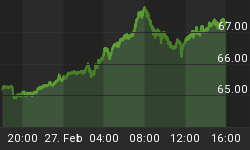Earlier this week, the Labor Department reported declines in both the Producer Price Index (PPI) and the Consumer Price Index (CPI). Various economists and television commentators believe that these declines are proof that slack in the economy is creating deflation and more than offsetting the inflationary impacts of government stimulus spending and money-printing by the Federal Reserve.
A deeper look at the CPI report shows a different picture:

Source: Department of Labor
The far right-hand column shows that the "All items" CPI headline data declined 0.4% over the past twelve months. This figure is what the deflationists are citing as evidence of deflation. However, the "All items less food and energy" figure rose 1.8%. The whopping 23% decline in energy led to the overall decline in prices or "deflation" that economists cite. It is worth nothing that it took a 23% drop in energy prices to create a 0.4% decline in CPI when energy prices are still so high compared to the last couple of decades.
Prices in the broader economy are not falling despite the worst recession since the 1930's because of the government's programs and the mind-boggling increase in the Federal Reserve's balance sheet. Velocity of money (spending and business transactions) has slowed due to the weakness in the economy. However, as reflected in the chart below, holdings of cash are exploding. As people in the deflation camp alter their deflationary forecasts, holders of cash will rightfully become nervous about their loss of purchasing power. As a result, the velocity of money will rise despite the weak economy - a theme quite common for highly indebted countries. To believe that there is deflation today and to assume it will continue into the future is to misunderstand the definition of inflation.

Market dislocations occur at major turning points when markets falsely forecast the path of inflation versus deflation. For example, in 1982 the market was incorrectly fearful of inflation, which meant stock and bond prices were quite low and provided for outstanding gains if the inflation fear was unfounded. As is now known, inflation had ended and thus it was a great time to buy stocks and bonds.
Today, the market is counting on deflation. As a result, gold is undervalued and US stocks and bonds are overvalued because the market believes deflation will persist until only mild inflation replaces it. As Peter Schiff says, "A little inflation is like being a little pregnant." Stock P/E's contract and interest rates rise during high inflation. As reflected in the chart above there is a huge amount of cash on the sidelines. When fear of deflation subsides and the harsh reality of inflation sets in, cash will flow to commodities and hard assets and thus lead to higher consumer prices rather than higher stock prices (until we have hyperinflation, which clearly is not on the market's mind).
In summary, stocks are rallying and investors believe in deflation. As of March 2009, the CPI is helping to inflate the deflation story. However, at some point, markets will either begin to discount that CPI will turn higher or there will be a rude awakening when the data is released. Either way, inflation will be a surprise because the markets are incorrectly discounting the future.















